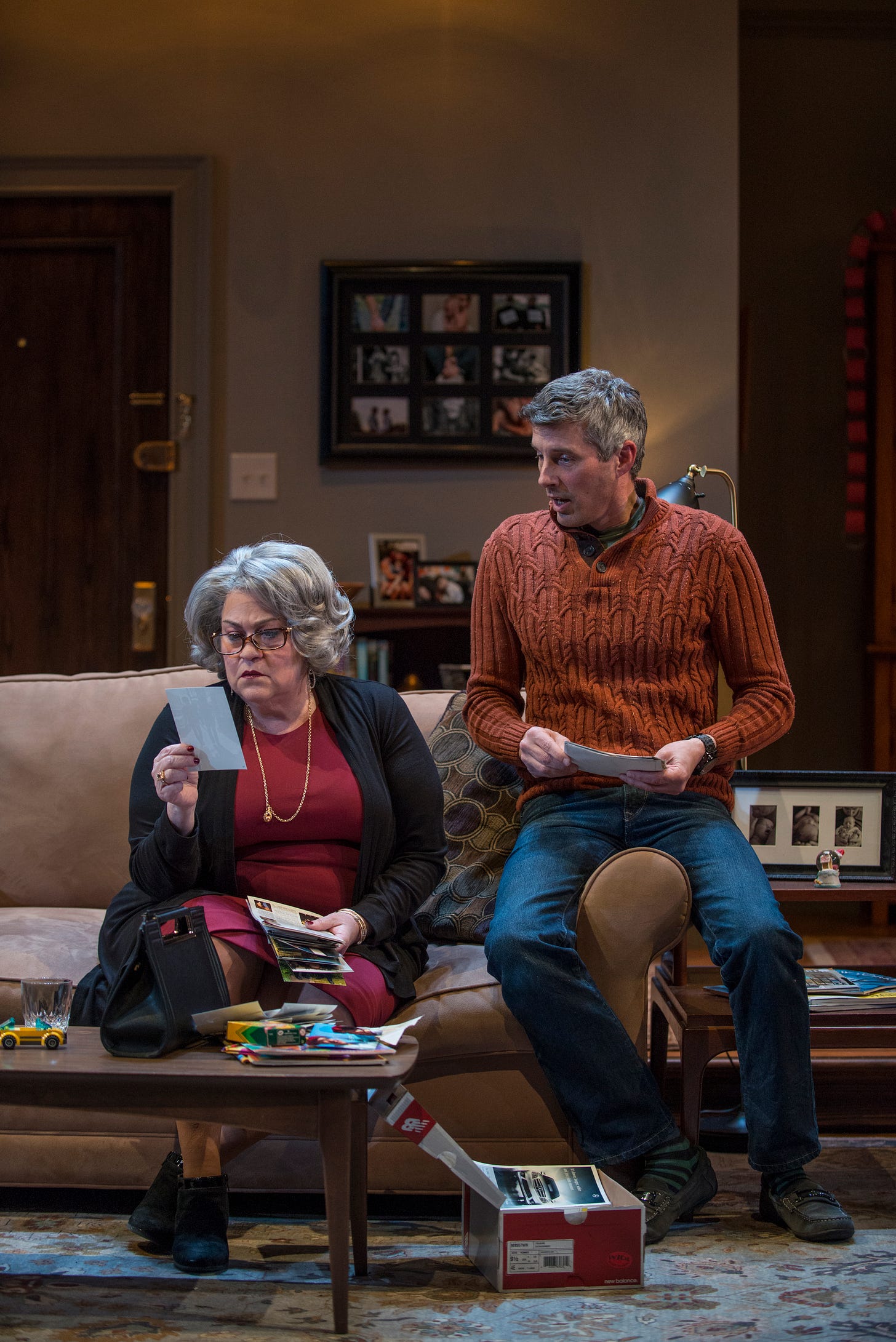
Cindy Gold and Jeff Parker in Northlight Theatre’s 2016 production of Mothers and Sons by Terrence McNally. Photograph: Michael Brosilow
I’ve mentioned here and there over the years that I wrote one of my biggest papers in college—the culmination of a four-semester honors humanities megacourse—on representations of AIDS in theater. That meant I read a lot of seminal ’80s and ’90s plays long before I got a chance to see them. Some of them I’ve still never seen staged.
Those included works like The Normal Heart, As Is, Angels in America, The Baltimore Waltz, Falsettos, Jeffrey—even Rent, which had just opened in the season prior. And it brought me my first two encounters with Terrence McNally: Love! Valour! Compassion!, and Andre’s Mother.
In 2016, almost two decades after that paper, I made the trek up to Northlight Theatre to review McNally’s latest play, Mothers and Sons. I somehow, blessedly, went into it without knowing it was a sequel of sorts to Andre’s Mother, written a quarter of a century later.
I don’t remember the moment in the play when I realized that’s what I was watching. But it hit me like a ton of bricks—I got unexpectedly emotional. I wrote in my review that “revisiting the characters of Andre's Mother … allows [McNally] the opportunity to incisively comment on those aspects of the present moment—marriage equality, gay parenting, HIV as a manageable disease—that no one was even considering as possibilities 20 years ago.”
But the play also felt like an extraordinary act of, if not forgiveness, at least empathy and kindness toward a character—Andre’s eponymous mother, whose name Andre’s lover had never known—who had previously represented so much cruelty born of ignorance, so many mothers who chose not to know things about their sons.
I thought back to that last night as I read The New York Times’s obituary for McNally, who died Tuesday at age 81 after becoming infected by the coronavirus. Specifically, this anecdote about McNally’s early romantic relationship with Edward Albee:
“Edward didn’t want to be reviewed as a gay playwright and was never comfortable coming out,” Mr. McNally told The San Francisco Chronicle in 2018. “That’s one of about a million reasons why that relationship was never going to go anywhere. I became invisible when press was around or at an opening night. I knew it was wrong. It’s so much work to live that way.” (Mr. Albee died in 2016.)
McNally’s output was prolific and varied, encompassing farce (The Ritz, It’s Only a Play), biography (Master Class), magical realism (A Perfect Ganesh), musical theater (the books for Ragtime, Kiss of the Spider Woman, Anastasia and more) and several opera librettos (Dead Man Walking was just produced by the Lyric in November). He was as likely to write plays about damaged but romantic heterosexuals (Frankie and Johnny in the Clair de Lune, to name one) as damaged but romantic homosexuals (The Lisbon Traviata, to name one).
But no matter his subject, he brought his whole self to every work. He didn’t shy away from being seen as a gay playwright even if he wasn’t always writing about the gay experience. And that career-long insistence that his sexuality was defining but not limiting was its own kind of trailblazing, emblematic of the compassion that allowed him to return to Andre’s mother 25 years after creating her and give her both a name—Katharine—and a voice with which to rage about all the opportunities AIDS stole from Andre and from herself. Surviving the decimating spread of one virus allowed McNally to write that second chapter. How terrible to see him taken by another.
Thanks for reading! This is the free edition of Storefront Rebellion, a newsletter about Chicago theater by Kris Vire. Send tips and feedback to kris@krisvire.com, and if you know someone you think would enjoy this newsletter, feel free to forward this to a friend.




This article packs a lot of insight into McNally's life and themes of his work. I feel like such an idiot never hearing that Albee and McNally were romantically involved. That quote from McNally that it wasn't going to work because "it's just too much work to live that way" really packs a wallop and makes one realize how courageous McNally was to live and work out of the closet during that time.